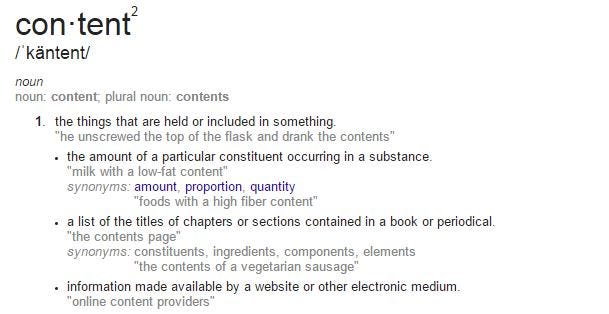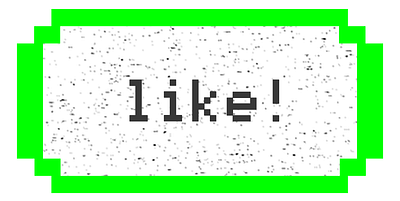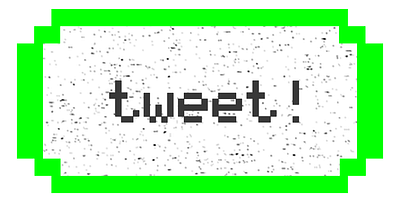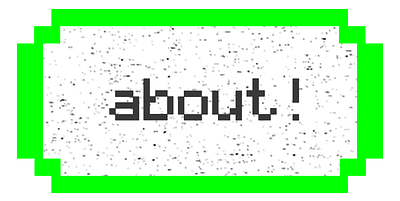How We Devalue Our Work, Simply by What We Call It

I write on the internet almost everyday. I don’t make any money doing it, but I do enjoy it immensely. However, my wife makes her living writing and designing on the web. Because of that, I know firsthand how valuable words and pictures are for a business’ internet presence. I also know how much work goes into making those two things — especially when they are done well.
As I have become more familiar with how valuable words and design are, and how difficult they can be to craft, I have come to dislike more and more the word that we’ve adopted to describe it: content.
Yuck. Content. Just reading it on the page is disheartening. How abstract. How utterly uninformative. How lazy.
Why is it that we’ve chosen that word to talk about the creative work that is essentially the backbone of every good website? Just look at the definition of the word:

Those first 3 definitions are the classic, pre-internet 2.0 definition of the word. They’re all vague. And that’s the point. “Content” basically means “whatever stuff is there, filling up the empty space.” In that sense, it doesn’t seem to indicate anything of value — just filler. That’s how our continued use of the word ‘content’ has begun to change how our work on the web is treated.
Vagueness Devalues
Imagine that you are at an open-air market in a foreign country. A vendor presents you with a jug of liquid, indicating that it’s for sale. She doesn’t speak English, so an interpreter asks on her behalf what you’d be willing to pay for the contents of the jug. “It’s some oil,” he says. How much do you think it’s worth?
Without any other information, you’d likely assign a low dollar value to it. You’d be right to do so. The way the object was described is vague, uninformative, and thus pretty much forces you to value it much less.
Now imagine that what was in the jug is actually a rich and robust first-press extra virgin olive oil, that the seller in the market worked very hard to make. The olives are of the finest quality, and were grown over years of meticulous cultivation. But all those years of work, and all of the expertise and knowledge it took to produce it has been reduced to a few generic words by a marketer who just wants to sell the product quickly.
Content — The Marketer’s Weasel Word
To me, “content” is a weasel word, if I’ve ever seen one. Observe:
A weasel word is an informal term for words and phrases aimed at creating an impression that a specific and/or meaningful statement has been made, when only a vague or ambiguous claim has been communicated, enabling the specific meaning to be denied if the statement is challenged.
So let’s look at how well the term “content” fits that definition of a weasel word:
- Is it a word? Check.
- Is it aimed at creating an impression that something specific and meaningful has been communicated? Check.
- Is it in reality just vague or ambiguous, enabling the specific meaning to be denied if the statement is challenged? Check.
The third bullet is the most damning. We creators have allowed ‘content’ to be increasingly used as a weasel word to describe what we do. It allows for companies to pay bottom dollar for words and pictures for their site because, hey, it’s just ‘content’! They’re not asking for art here, just content — some stuff to fill in that empty space; just some stuff one notch above lorem ipsum text to drive more clicks per page.
And that’s exactly what they’re getting, which means that’s exactly what we are getting. That’s what’s flooding the web — page after page of it; text and pictures that are just barely hashed out, and exist as filler, awaiting you to click through to the ads.
But It’s Just a Word, No Big Deal, Right?
Am I making a mountain out of a molehill? I mean, ‘content’ is just a word, and words are basically harmless, right?
Wrong.
Words have power, real power. They move people to action, they inform how people perceive things — as good or bad, valuable or worthless. We, as people who deal in words for a living, should be painfully aware of this. And since perceived value becomes real value, it’s easy to see that words which make people perceive something as less valuable end up making that thing less valuable in the marketplace. So, calling design and copy on the internet “content” is effectively a way to devalue what it really is.
Calling it ‘content’ is like calling a cask of painstakingly crafted and carefully aged wine ‘liquid’. It is vague, shortsighted, and damaging.
It should be no surprise, then that in the time that the word ‘content’ gained popularity as the term du jour, we’ve begun to witness a race to the bottom for quality writing and design. We see website copy that is sloppy, plagiarized, vacuous, or all three. Clickbait titles link to pages that are nothing but ad copy with little to no style or substance to them, and everyone is bidding lower and lower to produce it.
We do more than “create content”. We mindfully structure stories, pensively pen persuasive prose, and produce powerful poetry. We delicately string together stunning visual tapestries. We slice, dice, and seamlessly assemble cinematic experiences. This is not just content; it is our heart and soul. Perhaps a word more representative of that is in order. Better yet, perhaps one word is too few.
I leave it to the creators to decide.
Godpseed.



Hacker Noon is how hackers start their afternoons. We’re a part of the @AMI family. We are now accepting submissions and happy to discuss advertising & sponsorship opportunities.
If you enjoyed this story, we recommend reading our latest tech stories and trending tech stories. Until next time, don’t take the realities of the world for granted!

